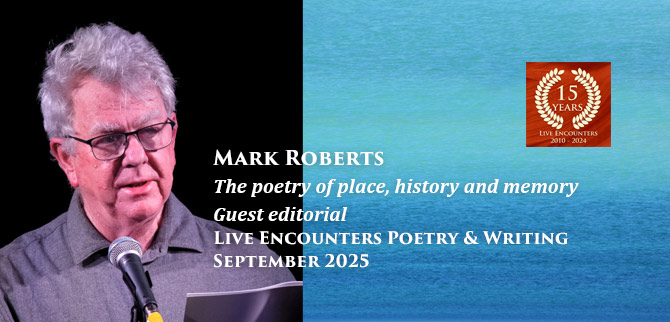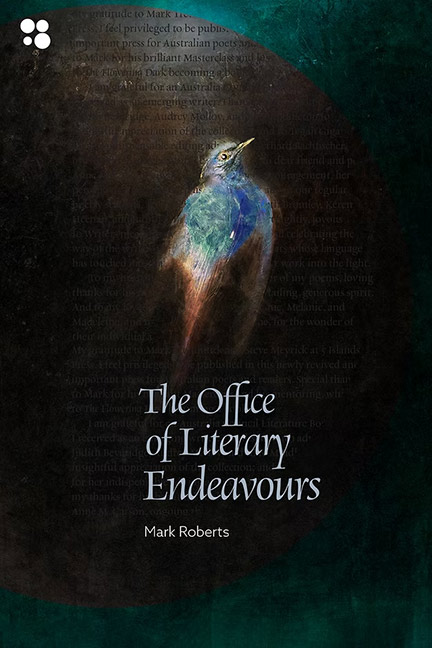
Live Encounters Poetry & Writing September 2025
The poetry of place, history and memory
guest editorial by Mark Roberts.

The poetry of place, history and memory
About a decade ago I started thinking about a project based on my memory of spending holidays and large blocks of my childhood on a farm run by my great aunts and uncle on the Cargo road between Orange and Cargo in the Central West of NSW, Australia. My memories covered the first 20 years or so of my life from the early 1960s through to the mid to late 1970s. At first this seemed to be a simple exercise. There were a number of memories that seemed to suit themselves well to poetry – travelling over the Blue Mountains as a child and looking down at clouds in the valley and imagining I was at the sea, looking down the main street of a town and seeing a paddock full of flowering canola like a sea of gold…. so I wrote some poems they were ok, but very one dimen-sional, much like a faded 1970s instamatic photograph.
Memory obviously wasn’t enough for me to produce a good poem. There needed to be some depth beyond the simple description – context, history narrative perhaps? So I decided to return to the place of these memories. Travelling over the mountains again I looked out across the country as I drove down Victoria Pass towards Lithgow I felt a recognition I hadn’t felt before. I had travelled through the area a number of times over the preceding decades but this time there was something different. I was looking at the country, trying to see into it, rather than just glancing at it.
A lot of things had changed since I was a child looking down at clouds or marveling at the gold of canola in flower. To start with I had learnt in school the accepted, colonial history of the place I was now looking down on. A history of settlement, explorers and empire (The British). There wasn’t much room for First Nations People in this narrative of my youth – if they were mentioned at all it was implied that they simply ‘melted’ away in the face of the expanding white settlement. Now as I looked down onto the country in front of me I new that I was entering Wiradyuri land and far from melting away they had fought bravely for their land.
Gaanha-bula
I’m standing at the top of Mount Canobolas/Gaanha-bula. It is a spring morning, the sun is out, but there is a hint of ice in the breeze which occasionally flicks a piece of yellow tape against the metal framework of a telecommunications tower. This is a return to a place, a connection with country stretching through my family, the hints and suggestions of a buried history, a land that fills the imagination.
I listen to the tape against the metal, like morse code tapping out a message. I listen for a pattern, but the wind swirls around the tower sending the sound in all directions. Above me I see microwave dishes, mobile cells and other pieces of electronic gadgetry. This is how we communicate. I listen for a hum which would suggest high frequency radio signals are flashing above my head. But there is nothing but the flickering of the yellow tape.
Gradually I hear further into the silence – the wind moving through the trees below, the distant sound of a car heading up a dirt road, the faint rumble of a plane invisible in the sky.
Published in The Office of Literary Endeavours (5 Islands Press 2025)
In many ways this was a way in for me. Like Tim Robinson I listened to the wind and it hinted at hidden histories and memories which reached back further than I imagined.
Of course if you are going to try and write poetry you need to read poetry, really read it – read it and read it again. So I started looking for and reading contemporary poets writing about place. In particular I read the work of Wiradyuri poets and writers. Jeanine Leane’s work was central to helping me connect with the hidden histories through poetry. Her poem ‘After the Silence the Echo’, which was part of the Dhuluny: the war that never ended exhibition at the Bathurst Regional gallery in 2024 to mark the 200-year anniversary of the declaration of Martial Law on 14 August 1824, became a powerful touchstone for me as I tried to place myself and my poetry in Wiradyuri country. The violence of the so-called Bathurst Wars, and its almost complete absence until recently from Australian history, has to inform how both First Australians and non-indigenous Australians, relate to the area around Bathurst and Orange. Leane’s poem concludes:
After the silence there’s an echo.
An echo is a sound bouncing back through time
repeating
an echo is a sound that curves around to
re-sound again…
and again…
and again…
An echo is the sound of the past
as it screams
down
through
time
through the barrel of a gun
at the end of a knife
from the thud of a stirrup iron.
An echo is resounding.
Silence is not peace.
The echo comes back
to break the silence…
again…
and again…
and again…
now…
as then…
as now…
As always.[1]
Once you accept the violence of the colonial past it necessarily impacts the way you view your past, your memories and how you represent them in poetry. Once of the memories I have tried to write about is the old car racing track at what was called Catalina Park in Katoomba. As a child we would drive through Katoomba on the way over the mountains to the farm. Down in a gully, off the old highway was a car racing track and, if a race meeting was on, you could hear the roar of the cars from the highway. I had tried to work this into a poem a number of times without success. The history of the racetrack, and the land it sat on, was, however, much more complicated. As settlement spread out from Sydney and across the mountains, many of the displaced Darug and Gundungurra people settled in a gully just west of the settlement of Katoomba. Over time it became a community and a central point of culture. Then, in the late 1940s the local council decided to build a car racing track on the site and the community was dispersed and demolished. Recently I read a poem by another Wiradyuri poet Jazz Money called ‘Gully Song’. While this poem is probably not about the Katoomba gully, it does provide another layer of history to the place I was trying to write about
a mist seeps
through this gully
and I can hear
song
feel smoke cling to
hair to lashes
hear the way
the old voices are
held here
– From how to make a basket UQP 2021
Auden once famously said that “poetry makes nothing happen”, what many fail to consider is that that section of ‘In Memory Of W.B. Yeats’ concludes with the lines “it survives,/ A way of happening, a mouth”. For me, creating poetry out of place, memory and history is a “way of happening”, an attempt at truth telling in verse. The understanding, the unearthing and recording in art of our understanding of what it means to be living on a country that has a history that has been deliberately hidden from us is what is driving much of my current poetic practice.
While my main work at present may be firmly centred on a particular area of Australia, the old saying ‘think locally act globally’ holds true here. Australia is not the only country trying to come to terms with its colonial past (particularly a British colonial past) and the value of international platforms such as Live Encounters is critical in reaching out to a global “village” of poets and readers. It is a privilege to be part of that village. The poetry of place can be, indeed, global.
[1] The complete poem can be read at https://rochfordstreetreview.com/2024/08/25/jeanine-leane-after-the-silence-the-echo/
© Mark Roberts
For much of the last four decades, Mark Roberts has been involved in writing, criticism and publishing. In 1982, he established P76 magazine in with Adam Aitken and has been involved in small press publishing ever since. In 2011 he set up the on-line journal Rochford Street Review, which is currently publishing Issue 42 https://rochfordstreetreview.com/
The Office of Literary Endeavours (5 Islands Press 2025) is Mark’s third book, after Stepping out of Line (Rochford Street Press 1986) and Concrete Flamingos, Island Press 2016.
https://www.5islandspress.com/product-page/the-office-of-literary-endeavours-by-mark-roberts


I really enjoyed your editorial Mark. I come from Ireland and live here again after many years in Germany and elsewhere…I feel your insights have that lovely local touch but resonate to wherever we might find ourselves. I’ve been to Oz a number of times and love it.
Thank you Terry. I will be in Ireland for a week in mid September. Ireland is another important place for me – most of my ancestors migrated (or were forcibly sent) to Australia.
We’re very much looking forward to welcoming you here to Carrick-on-Suir soon Mark, especially given your Tipperary forebears.